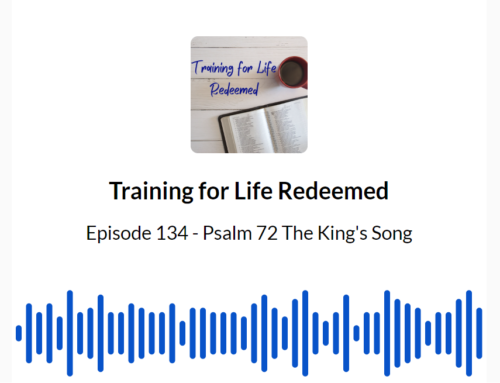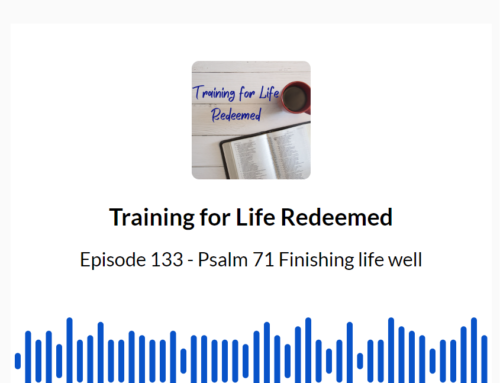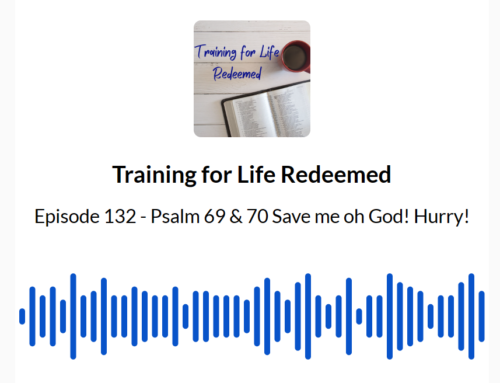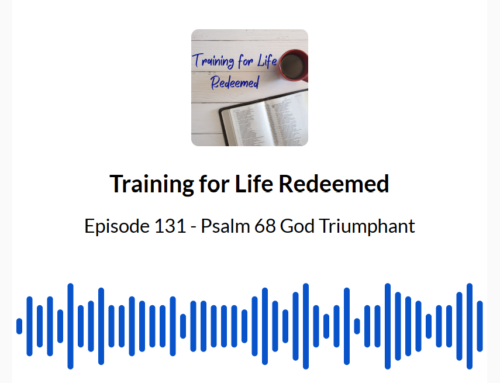First priority is the land that will be home to the tribe through which will come the promised king. On the way we get some insight into God’s treatment of an exemplary family.
Grab your notes for this episode by completing the form
and we will send you the link to all our notes.
Transcript
Dan:
Hi, everyone. And welcome to trainingforliferedeemed. And I’m your host, Dan. And as always, I am joined by my father, Dr. David Jackson. We are just over halfway. We finished part one of Joshua last week. So essentially the Israelites have come in. They’ve defeated most of the land, all the major kind of cities that, are listed throughout. And now we’re moving on to dividing the land up between each of the tribes and the allotments that were chosen by God to give to each of the tribes, et cetera. What’s important about giving everyone their land?
David:
Well, apart from the fact God’s promised everybody the land, it’s about coming back to Eden. It’s about coming back to God. It’s about having a home, not being a bunch of homeless, nobodies drifting around totally lost. We’ve finally arrived. God has granted them victory. They’ve driven, they’ve conquered all of the armies that might threaten them and the victory is won. And if you think about that in terms of the gospel, you know, Jesus did that for us on a cross. So that takes care of, part one, the deal is done. We own the land. We’ve got the gift from God. Now comes the really interesting bit and the really interesting bit is, what are you going to do with it? So the first question is, you’ve got a new house, who gets which room, so I’m sure you’re going to enjoy that in a little while.
Dan:
It’s already allocated.
David:
You’ve already sorted that out. Yeah. So in this case, it’s not “I’m arriving on my new house with two kids.” It’s I’m arriving in a whole country and I’ve got 12 tribes to sort out, and God is going to allocate that. Now we’ve already done two and a half tribes. They’re all sorted out there east of the Jordan. So now that we’re in the Western side of the promised land, the question’s going to be who gets which bit in what order and who gets to decide that. And the answer is God,
Dan:
Obviously this is kind of also their inheritance that they’re getting, and which bit of the land is kind of important because there’s fertility around some bits are a lot greener than the others. When I was there, some bits have a lot more fresh water than other bits, but, this is ultimately a land too, that relies on rainfall. And which is part of the thing with Israelis. They will rely on God throughout now. Caleb is the next bit that we’re going to talk about here. So Caleb,
David:
Yeah. So you’ve got this little problem. It’s interesting conversation between Caleb and Joshua. Two war buddies have been reminiscing going back to when Moses spoke to Caleb, Caleb’s, Caleb’s not an Israelite that comes a bit of a surprise. He is a Kennizite and for some way or another, he has been adopted into the tribe of Judah. So when the spies went in, Caleb was the representative for Judah and Joshua was the representative for Ephraim. And they’ve gone in to do the reconnaissance of the land. And Caleb was the one who speaks up and says, we can do it boys. We can do it. We can take out the big guys and everybody else says no. And later on, Joshua chimes in and says, not on with Caleb. So those are the two men who stood together. And in response, Moses said to them, you can have any land you put your foot on. and at this point, Caleb is reminding Joshua of that promise. So what’s happening here is we’ve looked at the big picture of the land. That’s going to be allocated to, you know, whole tribes. But in this case, we’re going to zoom down and see how it works out for one family. And Caleb is a fairly significant family. So at 85, he finishes the job of driving giants out of Hebron. He said, it could be done. He’s waited 40 years to do it. Now he’s done it. And that now raises, another issue because the land that he’s been allocated around Hebron includes a town called Debir and Debir. It just looks like Caleb’s is done. And he’s 85. He’s finished, let somebody else do the next town, but it’s somebody else from his clan. so there it is. And he makes this really in our culture, offensive decision, any you blokes want to take Debir, you can marry my daughter. At that point, I think every woman is screaming. We’re not cattle. You don’t give us a way, you know, we’re not your property. And that’s quite right. what we miss while we’re having that little scream is that in this culture, at this time, what Caleb was actually doing was providing a great blessing to his daughter. His daughter’s name is Achsah, which means anklet. so cute little name, Jewel, Pearl, something, something beautiful. But you imagine in our culture, that would be like telling a woman that you’re my property. I can give you a way for Achsah, for women at this time, what he’s doing is he’s endowing his daughter with a prime piece of real estate. And making sure that the man she marries is a man who will be a man of great reputation. Not our culture, but then we’re not a subsistence people living off the land. We don’t have to worry whether our daughter will have food, or whether she’ll be protected quite like this. So for Achsah, this is as much a blessing as it is for whoever the guy is that marries her. I think a lot of our objection to this comes from the idea that we think these girls had no say in the matter. And that’s why I think this case study is actually in the text because Achsah, the two fathers, dad’s done the deal, the man, the hero has gone and captured Debir and he’s come back to claim his bride. and the two men have made the decision Achsah arrives on her donkey. here’s your husband have a glass of wine off you go enjoy your new home. Achsah arrives gets off a donkey and goes to Dad and renegotiates the whole contract. And that I think is, a very critical window into the way God treats women and the way the gospel deals with women. This lady goes to Dad and says that there’s a hole in this inheritance, we need more water. What Springs have you got over there? How can you lay it out? And Dad says, yes. And she says beauty and off I go, the marriage is established. So there’s lots happening here. This teaches us, when we get over the fact that this isn’t our culture, that this is God taking care of his people and doing justice and giving women a voice. and hopefully having a father who will listen, that’s the other side of that story. This is good news for us. As they lay out all of this massive area of land, we’ve seen how it affects one little family, but there’s a problem in this text that I’ll leave you with. The hero of the story is in fact, the guy that owns the block of land next door, and the guy that owns the block of land next door is Caleb’s brother. So he has just married off his [brother’s] niece to his brother. And I’m not sure how that works, given Leviticus 18, but it happened. And I’ll leave you to go and have a look at Leviticus 18 and sort that out.
Dan:
God’s going to give Judah a fairly large portion, really, down the south. You’re kind of wandering in the desert a bit as you head further south.
David:
Yeah, Judah gets everything. If you look at it, you remember Judah, you’ve got part of their land goes dribbling down into the Dead Sea. So Ein Gedi and all that barren looking area down there, Masada, that’s in Judah and you climb up the side of the Ridge and you’ve got this, the rainy side of the Ridge with all that beautiful red soil. And then they get the slopes heading down toward the coast, which looks like Bega, south coast dairy country. And then if you go too far south you’re in the desert again, you’re going all the way back to the border with Egypt. So they’ve sort of got all of those, the whole range of geography so they can run sheep. They can run, olives and vineyards and they can grow plants so they can grow, you know, have sheep go chew the grass and that’s milk and honey milk on the Eastern side where the sheep are, cause they milk sheep. But on the Western side, it’s, you know, flowers and honey and all that sort of thing. So that Judah gets a lot, but why Judah,
Dan:
Because it’s the band Jesus is going to come from ultimately, but it’s, David’s tribe. It’s God kind of looking forward. And it’s the tribe that was promised to have Kings, that’s the other aspect of it is Israel. Jacob blessed Judah. And that blessing was that he was going to be the king and that the sceptre wasn’t going to leave his house and that kind of stuff.
David:
Yeah. So we’ve crossed off the first three sons of Israel, Reuben for sleeping with his stepmother, which wasn’t a really good idea. Levi and Simeon got disinherited by Jacob because they went in and slaughtered all the people in Shechem. Next son in line is Judah. And he’s the one God picks as his firstborn and he’s going to inherit; the king is going to come through that tribe. So the first block of land we allocate on the Western side is the land that belongs to the future king. So this is Judah. Judea comes up first. So God’s promises are being delivered. Problem is now all these people have got to move in and actually occupy it and that’s going to be a whole other story.
Dan:
Yeah. And they’re meant to go through and continue to kick out the people right, as they go through or are they meant to enslave them? Or what are they meant to do Dad, as they try and settle the land,
David:
They’re meant to set up a separate culture where God is centre and all the idols are gone, but they’re living, the Canaanites are there. They’re still worshiping Baal and 47 other gods. And they are tempted just to accommodate the local culture, just like Christians today, we are tempted to assimilate the values and the culture, of a secular society. How do we live, as a minority in a world that doesn’t believe in God or Jesus or anything? How do these people live in a society where everybody around them is worshiping Baal and sex gods and all sorts of horrible things? So do you drive that out or do you accommodate it and assimilate with it and that’s Israel’s next challenge. And for every believer, that’s our challenge. We go from, I have become a Christian to now, how do I put off my old habits and lifestyle and put on a godliness that Jesus died to give me? And that’s a challenge.
Dan:
Yeah. Yeah. It’s definitely not to go through and wipe out everyone else. Well, that brings us to the end of episode 43. So if you enjoyed listening to this episode, please make sure that you leave us a review. We would love to hear from you. If you want to grab the show notes, the study notes that go with this episode, please head over to trainingforliferedeemed.com/43, and you can grab everything there. Otherwise, please make sure you subscribe and come back next week. As we look at Joshua chapter 18, and it’s all about our lot in life.



